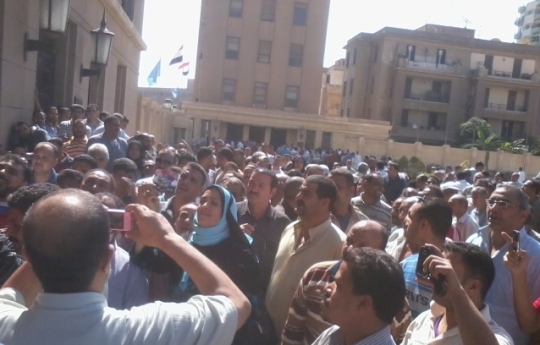Latest NEWS
- Aswat Masriya, the last word
- Roundup of Egypt's press headlines on March 15, 2017
- Roundup of Egypt's press headlines on March 14, 2017
- Former Egyptian President Hosni Mubarak to be released: lawyer
- Roundup of Egypt's press headlines on March 13, 2017
- Egypt's capital set to grow by half a million in 2017
- Egypt's wheat reserves to double with start of harvest -supply min
- Roundup of Egypt's press headlines on March 12, 2017
Company losses mount as Mahalla workers continue strike for 11th day

CAIRO, Oct. 31 (Aswat Masriya) - Workers at Mahallah’s Misr Spinning and Weaving Company, Egypt's largest textile plant, continued to strike on Saturday for the eleventh day, as company losses surpassed EGP 25 million, sources at the administration said.
The mounting losses are a "real catastrophe," the sources added.
A total of 17,000 workers began their strike action on Oct. 21 to demand a social allowance promised by President Abdel Fattah al-Sisi in a September decree, effective retroactively starting July.
The Mahallah workers insist on getting assurances that they will receive the 10 percent social bonus and a food allowance, before resuming production.
They say other textile companies have received the allowance, including Helwan’s Spinning and Weaving Company, al-Siouf Spinning and Weaving Company in Alexandria, Stia Spinning and Weaving Company in Alexandria and the Upper Egypt Spinning and Weaving Company.
The workers believe that spinning and weaving companies in Mahallah and the Kafr al-Dawar alone have been excluded to "pressure" the workers who took part in strikes.
The workers had ignored an ultimatum by the labour minister, which expired on Wednesday, the eighth day of the strike. The minister had told them to put off their strike before the government attends to their demands, warning that “legal measures will be taken against any attempts to obstruct work.”
On Thursday, a source inside the company who preferred to remain anonymous for fear of reprisal, said workers will continue striking until management presents a written document guaranteeing the company's commitment to deliver their financial demands.
Dalia Moussa, workers' coordinator at the Egyptian Center of Economic and Social Rights said eight workers were suspended on Thursday for six days.
With the number of workers dropping from 24,000 in 2008 to 17,000 today, she believes the management is planning to privatise the company.
The Mahallah textile company is known for its political significance as it has a long history of labour struggles.
In April 2008, the Mahallah textile workers had planned a strike to protest against the increased cost of living and low wages.
The strike attempt was thwarted, which pushed workers to take to the streets and clash with security forces. Calls for solidarity led to street clashes with police and the birth of the April 6 Youth Movement, one of the groups that electrified the January uprising.
The current strike comes amid heightened urban consumer inflation which jumped to 9.2 percent in September, according to the official statistics agency CAPMAS.
It also comes during difficult economic times in Egypt, which is still reeling from the aftermath of years of social and economic turmoil following the uprising.










